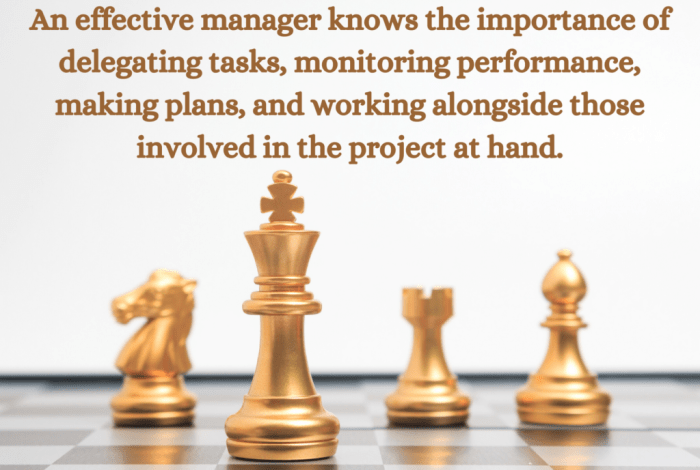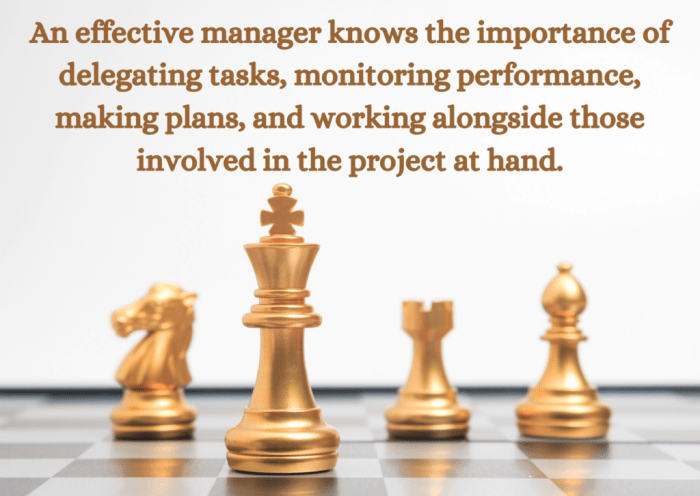
7 skills for a successful management career are essential for navigating the complexities of modern business. This post delves into defining success in management, exploring seven crucial skills—from communication and problem-solving to leadership and strategic thinking—and how to cultivate them for a thriving career.
We’ll examine the importance of these skills in diverse industries and provide real-world examples. Furthermore, we’ll offer actionable strategies for developing and refining these skills, empowering aspiring and current managers to excel in their roles.
Defining Successful Management
Successful management in today’s dynamic business environment transcends mere task completion. It encompasses a multifaceted approach that prioritizes strategic vision, effective communication, and a profound understanding of human capital. It’s not just about achieving targets; it’s about cultivating a thriving team and fostering a culture of innovation and growth. Effective managers inspire, motivate, and empower their teams to achieve extraordinary results while navigating the complexities of the modern workplace.Effective managers demonstrate a distinct set of characteristics that differentiate them from their less effective counterparts.
These qualities extend beyond technical expertise, encompassing interpersonal skills, strategic thinking, and a strong sense of responsibility. The hallmark of a successful manager is their ability to not only understand the “what” but also the “why” and “how” behind achieving organizational objectives. Their influence extends beyond their immediate teams, shaping the overall organizational culture and driving positive change.
Key Characteristics of Effective Managers
Effective managers possess a blend of technical skills, leadership qualities, and a profound understanding of human dynamics. Their ability to inspire and motivate their teams, combined with their strategic vision, is crucial for organizational success. This includes adaptability, problem-solving prowess, and the capacity to foster a collaborative environment. These qualities are fundamental to achieving high performance and building a successful team.
- Strategic Thinking: Effective managers excel at analyzing complex situations, identifying opportunities, and formulating strategies that align with the organization’s overall goals. They anticipate future trends and adapt their approaches accordingly. For instance, a manager who recognizes the potential of a new market segment and develops a strategy to capitalize on it exemplifies strategic thinking.
- Communication Proficiency: Clear, concise, and empathetic communication is essential for effective management. Managers must be able to articulate their vision, provide constructive feedback, and actively listen to their team members’ perspectives. An effective manager facilitates open communication channels, fostering trust and transparency.
- Decision-Making Skills: Managers face numerous decisions daily. Effective decision-making involves gathering information, considering various options, weighing potential risks and rewards, and making timely choices. A manager’s ability to make informed and decisive decisions under pressure is a crucial component of their effectiveness.
- Leadership & Empowerment: Effective managers inspire and motivate their teams, empowering them to take ownership of their work and contribute to the overall success of the organization. This involves fostering a positive work environment, providing opportunities for growth, and recognizing and rewarding achievements.
- Problem-Solving Capabilities: Effective managers are adept at identifying, analyzing, and resolving problems. They are equipped to deal with unforeseen circumstances, proactively identify potential issues, and implement solutions effectively. This skill is paramount in navigating complex situations and adapting to change.
Factors Contributing to a Successful Management Career
A successful management career is built on a foundation of continuous learning, professional development, and a strong work ethic. Networking, mentorship, and a willingness to adapt to changing market conditions are essential components. Furthermore, a proactive approach to career advancement, including seeking challenging assignments and acquiring new skills, will greatly contribute to long-term success.
- Continuous Learning: The business landscape is constantly evolving. Effective managers are lifelong learners, staying abreast of industry trends, new technologies, and best practices. This commitment to continuous learning is essential for maintaining relevance and adapting to changing market demands.
- Networking & Mentorship: Developing strong professional networks and seeking mentorship from experienced managers provides valuable insights, support, and opportunities. Mentors offer guidance, share their expertise, and provide crucial support in navigating the complexities of a management career.
- Adaptability & Resilience: The ability to adapt to change and overcome challenges is critical in a management role. Successful managers possess resilience, maintaining a positive outlook even during difficult times. The capacity to learn from mistakes and adjust strategies accordingly is crucial.
Evaluating Management Success
Evaluating the success of a management professional requires a comprehensive framework that encompasses various key performance indicators (KPIs). This involves assessing their ability to achieve organizational goals, the performance of their teams, and the overall impact they have on the organization.
| Criteria | Description | Measurement |
|---|---|---|
| Goal Achievement | Effectiveness in achieving organizational targets | Performance metrics, project completion rates, profitability |
| Team Performance | Productivity, morale, and engagement of the team | Team performance reviews, employee satisfaction surveys, productivity data |
| Innovation & Growth | Driving innovation and fostering organizational growth | New product launches, market share gains, process improvements |
| Leadership & Influence | Ability to inspire and motivate team members | Employee feedback, team engagement levels, leadership effectiveness assessments |
Hierarchical Structure of a Successful Management Career
A successful management career follows a hierarchical structure, progressing from entry-level roles to increasingly complex and strategic positions. This progression typically involves acquiring new skills, taking on greater responsibilities, and demonstrating increasing levels of leadership and influence.
- Entry-Level Management: Focus on operational efficiency and team coordination.
- Mid-Level Management: Increased strategic planning and responsibility for departmental performance.
- Senior Management: Overseeing entire functional areas or organizations, focusing on long-term strategic direction and organizational growth.
Essential Skills for Management Success
Navigating the complexities of the modern business world requires more than just technical expertise. Effective management hinges on a diverse skill set that empowers leaders to inspire teams, drive innovation, and achieve organizational goals. This blend of interpersonal, strategic, and technical abilities is crucial for success in any industry. From fostering collaboration to adapting to rapid change, these skills are the bedrock of impactful leadership.The successful manager of today must excel in a multifaceted environment.
They are responsible for coordinating diverse teams, adapting to shifting market trends, and ensuring that their organization stays ahead of the curve. These essential skills are not just theoretical concepts; they are practical tools for achieving tangible results in any management role.
Identifying Crucial Management Skills
Successful management is not a one-size-fits-all endeavor. The specific skills required vary based on the industry, the size of the organization, and the particular role. However, several key skills consistently emerge as critical for achieving success in a management career.
Communication Skills
Effective communication is paramount in a managerial role. It encompasses not only conveying information clearly but also actively listening to and understanding diverse perspectives. This involves verbal and written communication, as well as the ability to adapt communication styles to different audiences and situations. Strong communication fosters trust and collaboration within teams, allowing for better problem-solving and decision-making.
A manager who can clearly articulate goals, provide constructive feedback, and listen attentively to concerns builds a more engaged and productive workforce.
Leadership and Decision-Making
Leadership encompasses inspiring and motivating team members to achieve shared goals. A leader must foster a positive work environment, encourage collaboration, and provide guidance and support to team members. Decision-making is intrinsically linked to leadership. Managers must be able to analyze situations, weigh options, and make informed choices that benefit the organization. Strong leadership and decisive action are critical in rapidly changing environments where adaptability and speed are paramount.
Problem-Solving and Analytical Skills
Managers frequently encounter complex problems that require innovative solutions. Problem-solving involves identifying the root cause of issues, evaluating potential solutions, and implementing effective strategies. Analytical skills are essential for evaluating data, identifying trends, and making sound judgments. By combining problem-solving and analytical skills, managers can effectively navigate challenges and achieve optimal outcomes. These skills are crucial for navigating the complexities of the modern business world, where data-driven decisions are essential.
Teamwork and Collaboration
In today’s collaborative business environment, the ability to work effectively with others is essential. A successful manager fosters a collaborative spirit within their team, encourages open communication, and ensures that team members feel valued and empowered. Teamwork and collaboration are critical for achieving shared goals, maximizing efficiency, and fostering innovation. Effective teamwork can lead to more creative problem-solving and a more engaged and productive work environment.
Strategic Thinking and Planning
Strategic thinking allows managers to anticipate future trends, identify opportunities, and develop long-term plans to achieve organizational goals. Planning involves setting clear objectives, developing action plans, and allocating resources effectively. Strategic thinking and planning are essential for navigating uncertainties and adapting to changes in the business landscape. These skills are vital for organizations seeking to stay competitive and achieve long-term success.
Adaptability and Flexibility
The business landscape is constantly evolving, requiring managers to adapt to new technologies, market trends, and changing customer needs. Flexibility and adaptability are essential for navigating these shifts and ensuring that the organization remains agile and responsive. Successful managers are able to adjust their strategies, processes, and approaches as circumstances demand, allowing them to capitalize on opportunities and mitigate risks.
This adaptability is crucial for long-term success in today’s dynamic business environment.
Developing 7 key skills is crucial for a successful management career, encompassing strong communication, strategic thinking, and effective delegation. However, the vulnerabilities highlighted by recent reports, like the one on shodan sheds harsh spotlight on internet of things , underscore the importance of understanding and mitigating risks within today’s interconnected digital landscape. These skills, including problem-solving and adaptability, are essential to navigate such complex situations and lead teams effectively in a constantly evolving world.
Developing Management Skills
Developing these crucial management skills is an ongoing process that requires dedication and a commitment to continuous learning. This involves actively seeking opportunities for professional development, seeking mentorship, and engaging in self-assessment. Various approaches can help in developing these skills, including formal training programs, workshops, and on-the-job experience. Mentorship programs and self-study resources can significantly enhance skill development.
Furthermore, actively seeking feedback from peers and superiors can provide valuable insights for continuous improvement.
Communication Skills in Management

Effective communication is the cornerstone of successful management. It’s not just about conveying information; it’s about fostering understanding, building relationships, and motivating teams to achieve shared goals. Strong communication skills enable managers to navigate complex situations, resolve conflicts, and inspire their teams to excel. Without effective communication, even the most brilliant strategies can fail to materialize.Clear, concise, and empathetic communication forms the bedrock of trust and respect within a team.
Managers who master these skills are better equipped to inspire, motivate, and lead their teams toward collective success. This translates to higher productivity, stronger team cohesion, and a more positive work environment. The ability to connect with diverse stakeholders and tailor communication styles accordingly is crucial for navigating the complexities of the modern workplace.
Significance of Communication in Management Roles
Effective communication in management roles is paramount. It directly impacts team performance, project success, and overall organizational efficiency. Clear communication ensures everyone understands their roles, responsibilities, and the company’s vision. This clarity leads to fewer errors, improved productivity, and greater job satisfaction among team members. Moreover, effective communication facilitates the sharing of ideas and feedback, allowing for continuous improvement and innovation.
Various Communication Styles Used by Effective Managers
Effective managers utilize a range of communication styles, adapting their approach based on the situation and the audience. These styles include:
- Directive Communication: This style is characterized by clear instructions, direct feedback, and a structured approach. It’s particularly useful in crisis situations or when dealing with tasks requiring specific procedures. For instance, a manager might use this style to communicate urgent deadlines or critical safety protocols.
- Supportive Communication: This style focuses on building relationships and providing encouragement. Managers who utilize this approach foster a positive work environment and create opportunities for open dialogue. It’s helpful in motivating team members and resolving conflicts constructively.
- Collaborative Communication: This style involves actively seeking input from team members and fostering a sense of shared ownership. It’s highly effective in creative endeavors or when problem-solving as a team. An example would be a brainstorming session, where the manager encourages diverse perspectives and ideas.
- Transformational Communication: This style inspires and motivates employees to achieve their full potential by communicating a compelling vision and fostering a sense of purpose. This is critical for driving innovation and change within an organization. For instance, a manager might use this style to communicate a company’s mission and values to ignite enthusiasm.
Impact of Communication Skills on Team Performance
Strong communication skills directly impact team performance by fostering collaboration, clarity, and trust. Teams with effective communication channels can share information seamlessly, coordinate tasks efficiently, and address issues promptly. This results in higher productivity, reduced errors, and increased innovation. Furthermore, open communication channels build trust and rapport amongst team members, creating a more positive and productive work environment.
Methods of Communicating Effectively with Diverse Stakeholders
Effective communication with diverse stakeholders necessitates an understanding of their individual needs and communication preferences. Managers must tailor their approach to ensure that all stakeholders feel heard and understood. Strategies include:
- Active Listening: Paying close attention to what others are saying, both verbally and nonverbally, is crucial. This includes asking clarifying questions, summarizing key points, and demonstrating empathy.
- Cultural Sensitivity: Recognizing and respecting cultural differences in communication styles is vital. This includes being mindful of nonverbal cues, tone of voice, and preferred communication channels.
- Clear and Concise Language: Using language that is easily understood by all stakeholders, regardless of their background or technical expertise, is essential. Avoid jargon or technical terms where possible.
- Multiple Communication Channels: Utilizing various communication channels, such as emails, instant messaging, meetings, and presentations, ensures that information reaches all stakeholders effectively.
Examples of Effective Communication Strategies in Various Leadership Situations
Effective communication strategies in leadership situations vary depending on the context. Examples include:
- Delegating tasks: Clear communication about the task, expected outcome, and deadlines is crucial for successful delegation. Using a collaborative style, asking clarifying questions, and providing support, will help team members succeed.
- Providing feedback: Constructive feedback should be delivered in a timely manner, focusing on specific behaviors and their impact. The manager should use a supportive style, emphasizing both the positive and the areas for improvement. Using clear examples, and a focus on solution-oriented feedback, is critical.
- Motivating a team: Communicating a shared vision and inspiring employees to achieve goals requires using a transformational style. This includes articulating a compelling mission, fostering a sense of purpose, and acknowledging individual contributions.
Problem-Solving and Decision-Making Abilities
Effective management hinges on the ability to identify, analyze, and resolve problems swiftly and decisively. This involves not just reacting to crises, but proactively anticipating potential issues and developing strategies to mitigate them. Strong problem-solving skills are essential for navigating complex business environments and making sound decisions that drive organizational success.Problem-solving in management is more than just finding a solution; it’s about understanding the root cause of a problem, evaluating various options, and selecting the most effective course of action.
A successful manager must possess a systematic approach to identifying and addressing challenges, ensuring that the organization can adapt to changing circumstances and achieve its goals.
Identifying and Analyzing Problems in Business Contexts
A critical aspect of effective problem-solving is the ability to identify and analyze problems accurately. This requires a thorough understanding of the business context, including market trends, industry dynamics, and internal operational processes. Managers must cultivate a mindset that actively seeks out potential issues before they escalate into major crises.Identifying problems often involves gathering data from various sources. This might include market research reports, sales figures, customer feedback, and internal performance metrics.
Thorough analysis of this data allows managers to pinpoint the root cause of the problem, distinguish symptoms from the underlying issue, and develop targeted solutions.
Strategies for Identifying and Analyzing Problems
A structured approach to problem identification and analysis is crucial. A common framework involves the following steps:
- Defining the Problem Clearly: Clearly articulating the problem is the first step. This involves precisely defining the issue, separating symptoms from the core problem, and outlining the impact of the problem on the organization.
- Gathering Data and Information: Collect relevant data from various sources. This includes internal records, external market reports, customer feedback, and expert opinions. The more comprehensive the data, the better the understanding of the problem.
- Analyzing the Data: Analyze the collected data to identify patterns, trends, and correlations. Tools like SWOT analysis, root cause analysis, and data visualization can aid in this process.
- Developing Hypotheses: Based on the analysis, formulate potential explanations or hypotheses about the root cause of the problem. These hypotheses should be testable and provide a framework for developing solutions.
Making Sound Decisions in Complex Situations
Effective decision-making is crucial for navigating complex situations and achieving organizational goals. A well-defined decision-making process ensures that decisions are not impulsive or based on incomplete information.Making sound decisions involves a structured approach that balances data analysis with intuition and experience. It necessitates a careful consideration of various options, evaluating potential risks and rewards, and considering the impact on different stakeholders.
Steps in Making Sound Decisions
A systematic approach to decision-making involves several key steps:
- Define the Decision: Clearly define the decision to be made, including the objectives, constraints, and potential consequences.
- Gather Information: Collect relevant data and information from various sources, ensuring objectivity and completeness.
- Identify Alternatives: Generate a range of potential solutions or courses of action.
- Evaluate Alternatives: Assess the potential benefits, costs, and risks associated with each alternative, considering various perspectives.
- Choose the Best Alternative: Select the alternative that best aligns with the organization’s goals and objectives, considering potential risks and rewards.
- Implement the Decision: Put the chosen alternative into action, ensuring clear communication and effective execution.
- Monitor and Evaluate: Track the results of the decision, assess its effectiveness, and make adjustments as needed.
The Significance of Data Analysis in Management Decision-Making
Data analysis is essential for informed decision-making in management. Data-driven insights provide a robust foundation for understanding trends, predicting future outcomes, and identifying potential risks.
Data analysis empowers managers to make decisions based on evidence rather than assumptions.
Managers must effectively leverage various data analysis techniques to extract meaningful insights from data. This involves using statistical tools, data visualization techniques, and predictive modeling to understand market trends, customer behavior, and operational efficiency.
Evaluating the Impact of Decisions on Organizational Outcomes
Evaluating the impact of decisions on organizational outcomes is crucial for learning from past experiences and improving future decision-making. This involves tracking key performance indicators (KPIs), measuring the effectiveness of implemented strategies, and assessing the overall impact on various stakeholders.Thorough evaluation requires a comprehensive understanding of the organization’s goals and objectives. By measuring the impact of decisions against these benchmarks, managers can identify areas for improvement and refine future strategies.
Leadership and Team Management
Effective leadership is paramount to driving team performance and achieving organizational goals. Strong leaders inspire, motivate, and guide their teams, fostering a collaborative environment where individuals can thrive and contribute their best work. This section delves into the crucial aspects of leadership styles, team building, and overcoming challenges to cultivate high-performing teams.Leadership isn’t a one-size-fits-all approach; its effectiveness depends heavily on the specific context and the individuals involved.
Different leadership styles are suited to different situations, requiring adaptability and a nuanced understanding of team dynamics. Effective leaders are capable of recognizing these nuances and adjusting their approach accordingly.
Leadership Styles and Their Effectiveness
Leadership styles vary significantly, each with its own strengths and weaknesses. Understanding these variations allows managers to tailor their approach to optimize team performance in different circumstances.
- Transformational Leadership: This style inspires and motivates team members to achieve extraordinary results by articulating a compelling vision and fostering a sense of shared purpose. It emphasizes individual growth and empowerment, creating a highly engaged and motivated workforce. Transformational leaders often demonstrate high levels of charisma and intellectual stimulation.
- Transactional Leadership: This style focuses on clarifying expectations, providing rewards for meeting objectives, and addressing performance issues promptly. It works best in structured environments where clear goals and performance metrics are defined. Transactional leadership is particularly effective in crisis situations or when immediate results are critical.
- Servant Leadership: This approach prioritizes the needs of team members, empowering them to achieve their full potential. Servant leaders focus on building relationships, fostering collaboration, and ensuring team members feel supported and valued. This approach often yields high levels of trust and loyalty.
Building and Motivating High-Performing Teams
Creating a high-performing team requires a strategic approach to building a cohesive and motivated group.
- Team Composition: A diverse team brings a wider range of perspectives and skills, fostering creativity and problem-solving. However, team members should share common goals and be aligned with the team’s purpose.
- Effective Communication: Open and transparent communication is essential for fostering trust and collaboration. Clear communication channels ensure that information flows freely, reducing misunderstandings and promoting a sense of shared understanding.
- Recognition and Rewards: Recognizing and rewarding individual and team accomplishments is crucial for motivating high performance. Appropriate rewards can range from public acknowledgment to tangible incentives, depending on the team’s values and culture.
Strategies for Fostering Collaboration and Teamwork
Collaboration and teamwork are vital for achieving shared goals. Strategies to foster these are essential.
- Establish Clear Roles and Responsibilities: Clearly defined roles and responsibilities minimize confusion and ensure that everyone understands their contribution to the team’s overall objectives.
- Promote Open Communication and Feedback: Encouraging open communication and feedback channels allows team members to share ideas, concerns, and suggestions. Constructive feedback is essential for continuous improvement.
- Encourage Collaboration Tools: Utilize appropriate communication and collaboration tools to streamline workflows and facilitate seamless information exchange.
Leadership Challenges and Solutions
Effective leaders must anticipate and address potential challenges.
So, you’re aiming for a stellar management career? Seven key skills are crucial for success, like strong communication and strategic thinking. But in today’s digital landscape, understanding how search engines like Google operate is also vital. Check out this insightful article on Google’s algorithm dance – no fancy footwork for quality publishers to see how quality content creation remains paramount.
Ultimately, these 7 management skills, coupled with a focus on producing valuable content, are the cornerstones of a thriving career.
- Conflict Resolution: Addressing conflicts constructively is crucial for maintaining team cohesion. Leaders must facilitate productive dialogue, listen to different perspectives, and seek mutually agreeable solutions.
- Delegation and Empowerment: Effective leaders understand that delegating tasks and empowering team members fosters growth and responsibility. Clear expectations and support are vital to successful delegation.
- Managing Difficult Team Members: Dealing with difficult personalities or behaviors requires a tailored approach. Understanding the root cause of the issue and implementing appropriate strategies are essential.
Strategic Thinking and Planning
Strategic thinking is the cornerstone of successful management. It’s about envisioning the future, anticipating challenges, and developing plans to achieve organizational goals. Effective managers use strategic thinking to make informed decisions, allocate resources wisely, and adapt to changing market conditions. This approach ensures the organization remains competitive and resilient in the long term.Strategic planning isn’t just about creating a roadmap; it’s about fostering a proactive and future-oriented mindset within the organization.
It involves anticipating potential opportunities and threats, and adjusting strategies as needed. This iterative process requires ongoing evaluation and adaptation to ensure alignment with the evolving business landscape.
Importance of Strategic Thinking in Management
Strategic thinking is crucial for several reasons. It allows managers to anticipate future trends, adapt to changing circumstances, and make informed decisions. By considering the long-term implications of choices, managers can avoid short-sighted actions that might jeopardize the organization’s future. Strategic thinking fosters a proactive approach, enabling managers to capitalize on emerging opportunities and mitigate potential risks.
Steps in Developing and Implementing Strategic Plans
Developing and implementing strategic plans is a multi-step process. First, a comprehensive analysis of the current situation is essential, including the organization’s strengths, weaknesses, opportunities, and threats (SWOT analysis). This analysis forms the foundation for developing specific, measurable, achievable, relevant, and time-bound (SMART) goals. These goals then guide the creation of detailed action plans, outlining the tasks, responsibilities, and timelines required to achieve them.
Finally, effective implementation requires monitoring progress, adjusting strategies as needed, and evaluating the overall effectiveness of the plan.
Analyzing the External Environment and Internal Resources
Understanding the external environment is critical for developing effective strategies. This involves analyzing industry trends, competitor activities, economic conditions, and regulatory changes. A deep understanding of the internal resources available, including financial capital, human capital, and technological capabilities, allows for a more realistic assessment of the organization’s capacity to execute the strategic plan. The interplay between internal strengths and external opportunities, and the mitigation of weaknesses and threats, forms the basis for informed strategic decisions.
Long-Term Vision and Short-Term Planning
A long-term vision provides direction and purpose, while short-term planning ensures that the organization is consistently moving toward the vision. A clear long-term vision helps in aligning short-term objectives and actions. Short-term plans are crucial for managing daily operations and ensuring the organization remains agile and responsive to immediate needs. The balance between these two perspectives is vital for sustained success.
Evaluating the Effectiveness of Strategic Plans
Evaluating the effectiveness of strategic plans is crucial for continuous improvement. A robust evaluation framework involves establishing key performance indicators (KPIs) that align with the strategic goals. Regular monitoring of these KPIs provides insights into the plan’s progress and identifies any deviations or challenges. Feedback mechanisms, including surveys, focus groups, and performance reviews, allow for gathering insights from stakeholders and adjusting the plan as needed.
The ultimate goal is to identify areas for improvement and ensure that the strategic plan remains relevant and effective in achieving the organization’s objectives.
Adaptability and Continuous Learning
Navigating the modern business landscape demands a unique blend of flexibility and a commitment to growth. Managers who can adapt to shifting market conditions and embrace continuous learning are better positioned to lead their teams through challenges and capitalize on opportunities. This adaptability extends beyond just reacting to change; it encompasses proactively anticipating future trends and fostering a culture of learning within the organization.Successful managers understand that the ability to adapt and continuously learn is not a one-time achievement, but rather an ongoing process.
This involves a willingness to embrace new technologies, methodologies, and approaches, and to modify existing strategies as needed. By cultivating a growth mindset, managers create an environment where innovation flourishes and the organization remains competitive.
Importance of Adaptability in a Dynamic Business Environment
Adaptability is crucial for managers in today’s rapidly evolving business world. Market forces, technological advancements, and economic shifts can drastically alter the landscape in a short time. Managers who lack the ability to adjust their strategies and approaches risk falling behind their competitors and losing their teams’ trust. The ability to quickly and effectively respond to these changes is paramount for success.
Strategies for Adapting to Changing Market Conditions and Emerging Technologies
Proactive adaptation strategies involve anticipating future trends, understanding the implications of new technologies, and developing contingency plans. Staying informed about market trends through industry research, attending conferences, and networking with peers is vital. Embracing a data-driven approach allows for a more precise understanding of market dynamics.
Seven key skills are crucial for a successful management career, like strong communication and problem-solving. But beyond those fundamentals, understanding the evolving landscape of information gathering is equally important. Microsoft’s foray into news gathering, as detailed in this article microsoft takes a stab at news gathering , highlights how staying informed is now more critical than ever.
Ultimately, a modern manager needs these crucial skills to lead effectively and adapt to rapid change.
- Monitoring industry news and publications to identify emerging trends.
- Actively seeking out new technologies and their potential applications within the organization.
- Creating cross-functional teams to explore innovative solutions and foster collaboration across departments.
- Implementing agile methodologies to respond quickly to changing market conditions.
Importance of Continuous Learning and Professional Development in Management
Continuous learning is not merely a desirable trait but a necessity for effective management. In today’s dynamic environment, knowledge and skills rapidly become obsolete. Managers who commit to ongoing professional development demonstrate a dedication to their craft and inspire similar commitment within their teams. This ongoing growth translates into a more agile and responsive organization capable of adapting to change.
- Attending workshops, seminars, and conferences to expand knowledge and skillset.
- Engaging in online learning platforms and courses to stay updated on industry best practices.
- Mentoring and seeking feedback from experienced professionals to identify areas for improvement.
- Embracing a growth mindset to view challenges as opportunities for learning and development.
Identifying and Addressing Skill Gaps in a Management Career, 7 skills for a successful management career
Regularly assessing and addressing skill gaps is essential for professional growth. This involves self-reflection, feedback from peers and superiors, and identifying areas where additional training or development is required. Managers can leverage resources such as online courses, mentorship programs, or internal training initiatives to close these gaps.
- Conduct regular self-assessments to identify areas needing improvement.
- Seek feedback from peers and superiors to gain an objective perspective.
- Utilize online courses, mentorship programs, and internal training resources to acquire new skills.
- Participate in industry events and conferences to network with professionals and learn from their experiences.
Examples of Successful Adaptation Strategies Employed by Managers
Successful managers often demonstrate adaptability by proactively anticipating industry trends and implementing strategies that support their organization’s future. One notable example is the transition to remote work during the pandemic. Managers who were prepared to implement remote work strategies effectively were able to keep their teams productive and engaged during this significant shift. Another example includes a company that quickly adopted cloud-based technologies to improve efficiency and productivity.
This agility allowed the company to maintain a competitive edge in a rapidly changing market.
Creating a Table of Skills: 7 Skills For A Successful Management Career

Mastering management requires a diverse skill set. Beyond the theoretical frameworks and strategic blueprints, successful managers need practical, actionable abilities to thrive in today’s dynamic environment. This section dives into organizing and visualizing these crucial skills for a clear understanding of their roles and development.
Organizing Management Skills
A structured approach to management skills allows for targeted development and practical application. Categorizing these skills into a table provides a clear, concise, and easily digestible overview, making it easier to identify areas for improvement and track progress. This structured approach empowers managers to prioritize their development and effectively address gaps in their skillset.
Management Skill Table
| Skill | Description | Practical Examples | Development Strategies |
|---|---|---|---|
| Communication | Effective communication involves clearly conveying information, actively listening to others, and adapting communication styles to different audiences. It’s a fundamental aspect of leadership, collaboration, and decision-making. | Giving clear instructions to a team, actively listening during feedback sessions, adapting communication style for different stakeholders, and delivering presentations that resonate with the audience. | Taking communication workshops, practicing active listening techniques, seeking feedback on communication style, and maintaining a detailed record of communication processes. |
| Problem-Solving | Problem-solving is the ability to identify, analyze, and resolve issues effectively. It involves critical thinking, creativity, and the ability to develop and implement effective solutions. | Identifying and addressing bottlenecks in project timelines, finding solutions to customer complaints, resolving conflicts within teams, and developing innovative solutions to business challenges. | Enrolling in problem-solving courses, participating in brainstorming sessions, analyzing past problem-solving experiences, and documenting successful problem-solving methodologies. |
| Decision-Making | Decision-making involves analyzing information, evaluating options, and selecting the best course of action. It’s a core aspect of effective management, influencing outcomes and strategic direction. | Making strategic decisions about resource allocation, selecting the best candidate for a position, choosing the most appropriate marketing strategy, and deciding on the best response to a crisis. | Seeking diverse perspectives before making decisions, conducting thorough research before choosing a course of action, practicing risk assessment, and reviewing past decisions for lessons learned. |
| Leadership | Leadership involves inspiring, motivating, and guiding individuals towards a common goal. It encompasses setting a vision, fostering collaboration, and empowering team members. | Motivating team members during challenging projects, providing constructive feedback and coaching, empowering team members to take ownership of tasks, and establishing a positive team culture. | Seeking mentorship from experienced leaders, observing and analyzing successful leadership styles, participating in leadership workshops, and actively practicing delegation. |
| Strategic Thinking | Strategic thinking involves envisioning the future, identifying opportunities, and developing long-term plans to achieve organizational goals. | Developing a five-year strategic plan for a company, anticipating market trends and adapting strategies accordingly, analyzing competitors and identifying potential threats, and formulating innovative approaches to enhance market positioning. | Reading industry reports and articles, attending industry conferences, participating in strategic planning sessions, and conducting market research. |
| Adaptability | Adaptability is the capacity to adjust to changing circumstances and embrace new situations. It’s essential for navigating unpredictable environments and ensuring continuous growth. | Adapting project timelines to unforeseen delays, adjusting to shifting market demands, modifying strategies in response to competitor actions, and handling unexpected changes in team dynamics. | Seeking out new experiences, embracing challenges, practicing flexibility, and reflecting on past adaptability efforts. |
| Continuous Learning | Continuous learning involves a commitment to expanding knowledge and skills throughout one’s career. It’s essential for staying relevant and improving performance. | Attending industry conferences, pursuing professional certifications, reading industry publications, and seeking out opportunities for skill development. | Developing a personal learning plan, participating in online courses, seeking feedback on areas for improvement, and actively seeking out new knowledge and experiences. |
Closing Notes
In conclusion, cultivating these seven essential management skills—communication, problem-solving, leadership, strategic thinking, adaptability, and continuous learning—is key to achieving success in today’s dynamic business landscape. By mastering these skills, managers can not only excel in their roles but also contribute significantly to the overall success of their organizations. It’s a continuous journey of development and refinement, so keep learning and growing!






